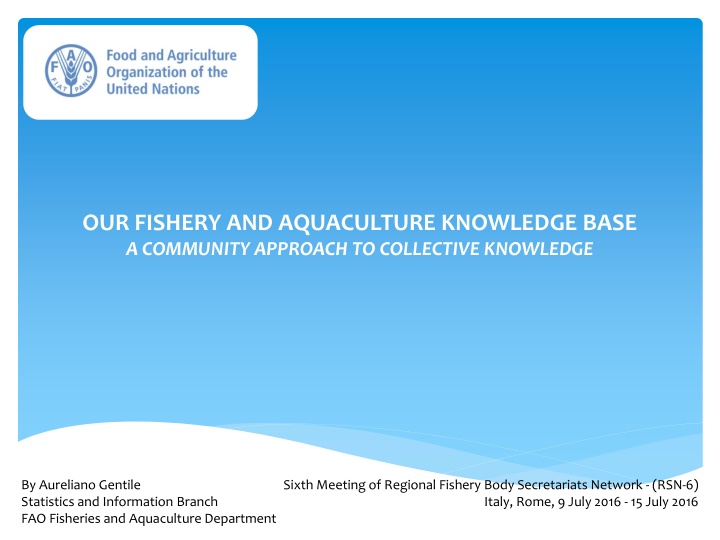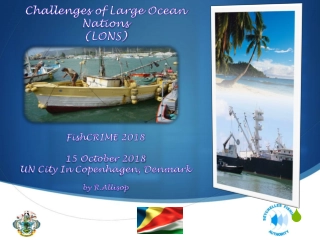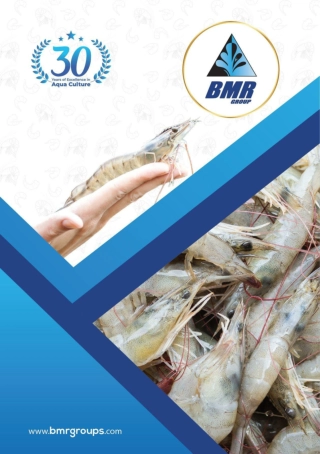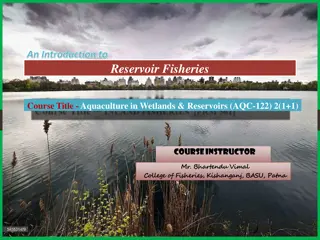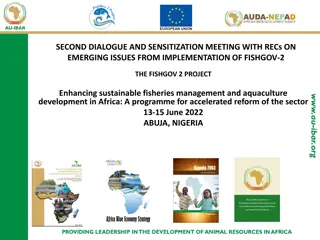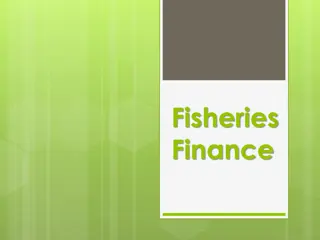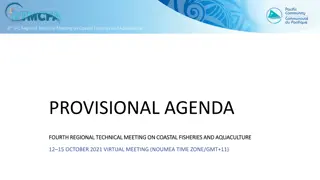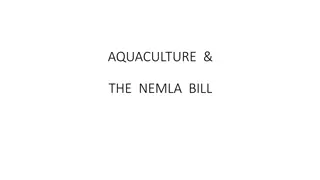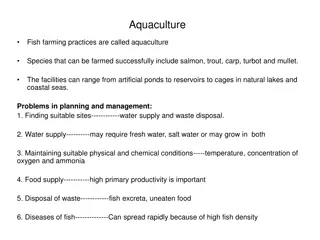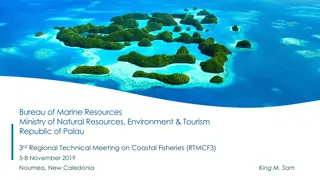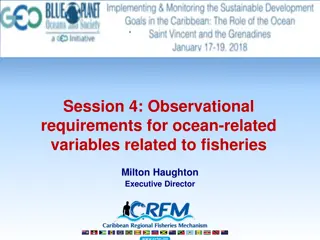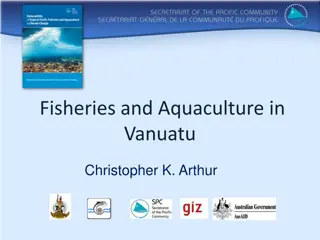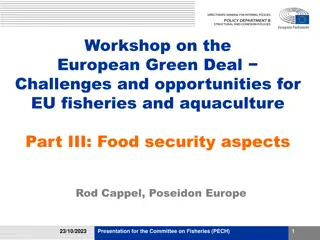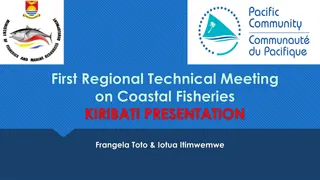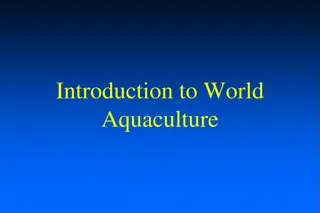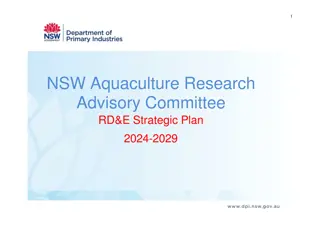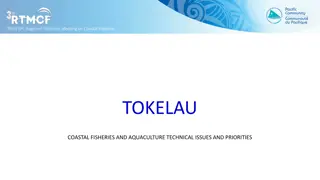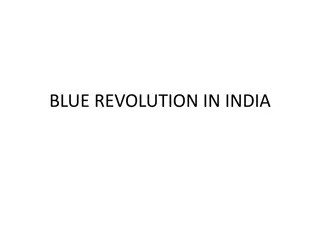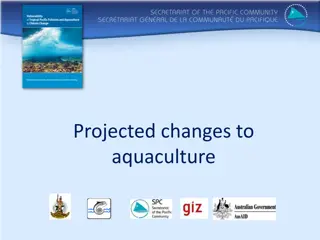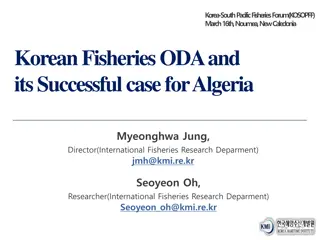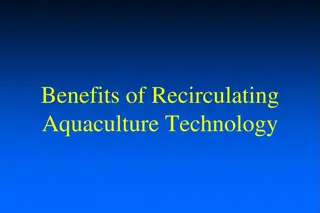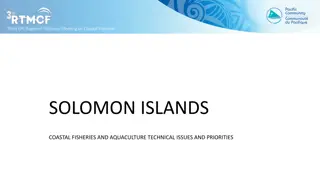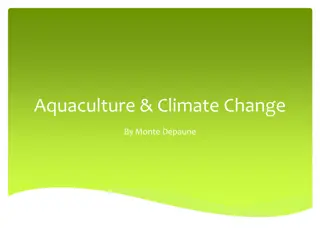Enhancing Fisheries and Aquaculture Knowledge for Sustainable Development
The Fishery and Aquaculture Knowledge Base, presented at the Sixth Meeting of Regional Fishery Body Secretariats Network, focuses on collective knowledge exchange in the fisheries and aquaculture sector. This knowledge hub offers a wealth of information on various aspects, supporting Sustainable Development Goal 14 for ocean conservation. Regional Fishery Bodies play a crucial role in contributing and disseminating essential data to build a comprehensive knowledge base for global relevance.
Download Presentation

Please find below an Image/Link to download the presentation.
The content on the website is provided AS IS for your information and personal use only. It may not be sold, licensed, or shared on other websites without obtaining consent from the author.If you encounter any issues during the download, it is possible that the publisher has removed the file from their server.
You are allowed to download the files provided on this website for personal or commercial use, subject to the condition that they are used lawfully. All files are the property of their respective owners.
The content on the website is provided AS IS for your information and personal use only. It may not be sold, licensed, or shared on other websites without obtaining consent from the author.
E N D
Presentation Transcript
OUR FISHERY AND AQUACULTURE KNOWLEDGE BASE A COMMUNITY APPROACH TO COLLECTIVE KNOWLEDGE By Aureliano Gentile Statistics and Information Branch FAO Fisheries and Aquaculture Department Sixth Meeting of Regional Fishery Body Secretariats Network - (RSN-6) Italy, Rome, 9 July 2016 - 15 July 2016
OUR FISHERY AND AQUACULTURE KNOWLEDGE BASE Working Definition The Fishery and Aquaculture knowledge base is a public* pool of information available as a coherent package of knowledge for easy access by the fisheries and aquaculture community. *Or as required access-restricted Area Area Capture Fishery Fishery Geartype Geartype Aquaculture Measures Species Species Aquatic Species Aquaculture Aquaculture Stock Stock Stock VME VME VME Fishery
OUR FISHERY AND AQUACULTURE KNOWLEDGE BASE Supporting the Sustainable Development Goals The Fishery and Aquaculture knowledge base can support the Sustainable Development Goals SDG 14. Conserve and sustainably use the oceans, seas and marine resources for sustainable development
OUR FISHERY AND AQUACULTURE KNOWLEDGE BASE RFB involvement The ever growing amount of information which has been collected, collated and disseminated in the last twenty years constitutes our joint Fishery and Aquaculture knowledge base with the hope to serve more and more interested communities. A considerable amount of information originates from Regional Fishery Bodies under different agreements of provision.
OUR FISHERY AND AQUACULTURE KNOWLEDGE BASE RFB involvement Some examples of collective knowledge of global relevance
OUR FISHERY AND AQUACULTURE KNOWLEDGE BASE RFB involvement Some examples of collective knowledge of global relevance
OUR FISHERY AND AQUACULTURE KNOWLEDGE BASE RFB involvement RFB acronym RFB fact sheets and map viewer Coordinating Working Party on Fishery Statistics (CWP) / Statlant questionnaires Stocks & Fisheries - FIRMS Partnership Vulnerable Marine Ecosystems database Database of measures on conservation and management of sharks FACP & NASOs Global Record of Fishing Vessels Consolidated List of Authorized Vessels (CLAV) Atlas of Tuna and Billfish Catches Global Tuna Nominal Catches Examples of shared information and related RFBs involvement under different types of data provision arrangements ACAP ACFR APFIC BOBP-IGO CACFISH CCAMLR CCBSP CCSBT CECAF CIFAA COFREMAR COMHAFAT-ATLAFCO X X X X X X X X X X X X X X X X X X X X X X X X X X X COPESCAALC COREP CPPS CRFM CTMFM EIFAAC FCWC FFA GFCM IATTC ICCAT ICES IOTC IPHC IWC JOINTFISH LTA LVFO MRC NACA NAFO NAMMCO NASCO NEAFC NPAFC NPFC OLDEPESCA OSPESCA PERSGA PICES PSC RECOFI SEAFDEC SEAFO SIOFA SPC SPRFMO SRFC SWIOFC WCPFC WECAFC X X X X X X X X X X X X X X X X X X X X X X X X X X X X X X X X X X X X X X X X X X X More than twenty RFBs and other institutions are contributing in different ways to the Fishery and Aquaculture knowledge base X X X X X X X X X X X X X X X X X X X X X X X X X X X X X X X X X X X X X X X X X X X X X X X X X X X X X X X X X X X X X X X X X
OUR FISHERY AND AQUACULTURE KNOWLEDGE BASE Benefits This amount of shared information is part of the Fishery and Aquaculture knowledge base offered to the community in a form of collective knowledge. Benefits for information gathering and mutual exchange, with FAO disseminating third party information : Overall, Partners return on investment include credibility, reliability, neutrality, as well as high visibility. Data owners and data providers can also benefit from global data services in fisheries exposed under a common data sharing policy.
OUR FISHERY AND AQUACULTURE KNOWLEDGE BASE Building on global data services Beyond assets already achieved, FAO-FI now develops partnerships for innovative IT solutions, with delivery of Global Data services (e.g. VME Database, Tuna Atlas, Regional Data Bases, Remote Sensing assisted Aquaculture inventories, Global Fishing Watch)
OUR FISHERY AND AQUACULTURE KNOWLEDGE BASE Building on global data services The VME Database, a success story of return on investment
OUR FISHERY AND AQUACULTURE KNOWLEDGE BASE How to strengthen authoritativeness and usage Timeliness: Reporting and publishing as soon as updates are available; here the rapidity and efficiency of the information flows make the difference; timely information drive users in selecting their preferred content providers. The FAO-FI department is committed to produce databases of information and update them as frequently as possible. To foster timely updates, there is a need for imagining business models building on joint efforts. Ensuring the effective reutilization of information and data can attract global donors interested in contributing to the collective knowledge on fisheries and aquaculture and to its impact.
OUR FISHERY AND AQUACULTURE KNOWLEDGE BASE RSN is invited to The RSN is invited to comment focusing on the recognition of the statements enunciated. Any indication on further forms of return on investment is also welcome. The RSN is invited to confirm the overall will to contribute to the collective knowledge on fisheries and aquaculture, and to indicate any will to commit to timeliness in the provision of information contributions wherever these have been agreed. Indication of constraints preventing timeliness will enable collaborative thinking and suggestions to resolve timeliness issues. The RSN might suggest actions to move forward. I.e. to involve those RFBs so far not yet directly involved in contributions, to investigate other areas of intervention where shared information could make the difference, etc. UNFSA fund could be used to support the reporting. E.g. for supporting consultancies within FAO that will liaise and assist RFBs who cannot afford to provide timely reports
